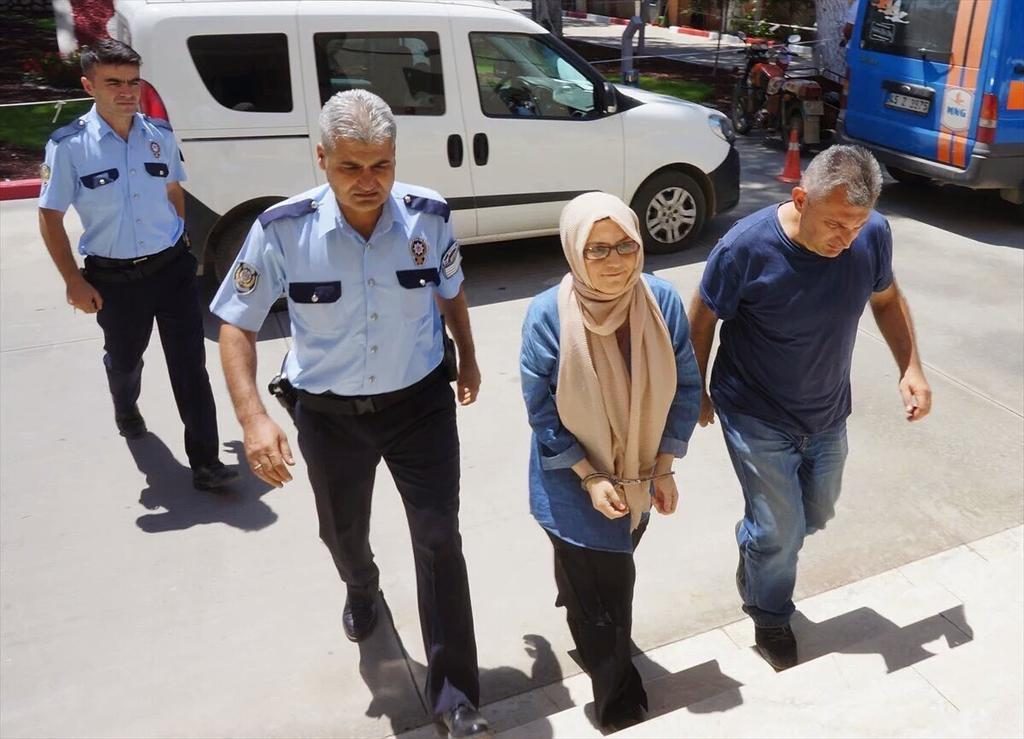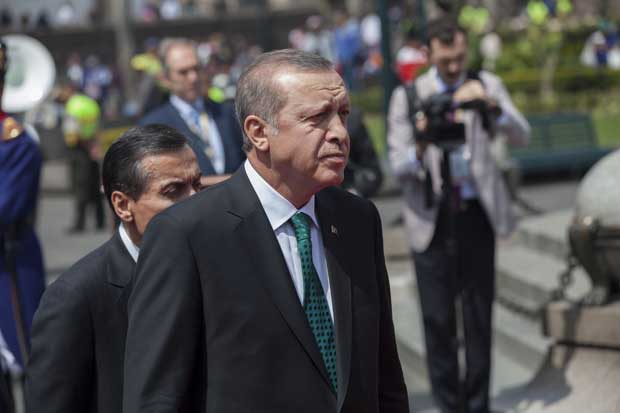27 Jul 2016 | Europe and Central Asia, Mapping Media Freedom, mobile, News and features, Turkey, Turkey Uncensored

Büşra Erdal, who surrendered in Manisa, taken to police headquarters in handcuffs.
“It was very, very close,” according to a source who followed the case of columnist and human rights lawyer Orhan Kemal Cengiz. By a hair he had avoided detention. While Cengiz has now been released, he is unable to travel abroad.
During the interrogation, Cengiz had repeatedly been asked about critical tweets he had posted about a year ago. “Those who led the interrogation were utterly hostile, seemingly set for finding a pretext to hold him in custody,” my source said. Cengiz’s friends believe that his impeccable international reputation and his work for the European Court of Human Rights, where he has defended Kurds and even, in a couple of cases, Turkish Islamists against the state, may have saved him from a jail cell.
However, there is nothing to suggest the easing this post-coup witch hunt. Yesterday, the veteran journalist Nazlı Ilıcak was arrested at a police checkpoint in Bodrum and taken into custody. Judicial affairs journalist Büşra Erdal surrendered after she tweeted that she was being punished for her work. Sadly the powerful Doğan Media Group outlets, of which both honourable journalists are affiliated, remained silent. Not a word of support was seen in any of the group’s newspapers.
The only support came from the Enis Berberoğlu, former chief editor at Hürriyet and now MP and deputy of the main opposition Republican People’s Party (CHP), who tweeted: “As their superior once, I was mainly responsible for the stories and the sections that Bülent Mumay and Arda Akın wrote and worked for. I vouch and stand for them.”
Against the backdrop of the authorities’ search for 42 journalists, pro-government media was busy on Tuesday inciting hatred for the columnists and asking for their imprisonment, including the daily Akşam. The pro-Justice and Development Party (AKP) daily Sabah added to the flames by accusing columnists such as Hasan Cemal, Kadri Gürsel, Cengiz Çandar, Perihan Mağden, Mehmet Altan and others of provoking the coup. These journalists and columnists are no longer allowed to express themselves in any media outlet.
Perhaps more than anything else, it was a crucial legal appointment that worried Turkey’s dissident figures in media and academia. In a hasty move, the government named İrfan Fidan as the chief prosecutor for Istanbul. Until Monday, Fidan was a deputy attorney in Istanbul’s Anti-Terror and Organised Crime Unit. What’s most notable, however, is that Fidan was the prosecutor who sentenced Cumhuriyet editors Erdem Gül and Can Dündar to five years and five years and ten months, respectively, in prison. The pair had covered the alleged supply of arms to Syrian jihadist groups by the Turkish secret service.
Academic Esra Mungan and three others who had signed the peace petition for the Kurds clashed were also detained due to his efforts. In another example, Fidan had taken over the case that implicated high-ranking AKP ministers and president Recep Tayyip Erdogan’s family members in corruption. He dismissed all charges.
Many fear, therefore, that his appointment to such a powerful post may come to mean a steep escalation against journalists and scholars in the coming weeks.
All other signs, too, indicate harder times.
On Monday night, in the midst of turmoil, Erdogan ratified the law which, in practice, subordinates the high judiciary to the political executive and immediately after the Board of Judges and Prosecutors, led by the Justice Ministry, implemented a long series of appointments and removals in the Court of Cassation and Council of State.
Erdogan met with two opposition party leaders. CHP and Nationalist Movement Party leaders were invited, but not the third largest elected one, the pro-Kurdish Peoples’ Democratic Party. It was a deliberate choice, raising eyebrows on how serious the ruling AKP is about rebuilding democracy. In addition, Erdogan spoke for a possible extension of emergency rule for an additional three months.
Meanwhile, Turkey will be run by decrees and everybody knows what that means.
A version of this article was originally posted to Suddeutsche Zeitung. It is published here with permission of the author.

Turkey Uncensored is an Index on Censorship project to publish a series of articles from censored Turkish writers, artists and translators.
21 Jul 2016 | Europe and Central Asia, Mapping Media Freedom, mobile, News and features, Turkey, Turkey Uncensored
The failed 15 July coup, bloody and despicable, delivered a lethal blow to the already crippled democratic order in Turkey. The cabal behind the putsch has become a midwife to Turkey’s “autogolpe” or self-coup. With every step, President Reccep Tayyip Erdogan and his Justice and Development Party (AKP) backers have introduced further restrictive sanctions.
This creeping self-coup is a prospect I raised in early 2014 with a long analysis for the German edition of Le Monde Diplomatique entitled Putsch im Zeitlupe. In that article I pointed out the parallels between the career of Alberto Fujimori, the former Peruvian president who is in prison for his corruption, and the increasingly autocratic methods employed by Erdogan.
The reaction to the totally unacceptable coup so far sadly has endorsed my theory. The reformatting of the Turkish state is now in fast-forward mode with a massive purge underway.
Tension has spilled over into academia. The head of the Supreme Board of High Education (YÖK), which itself is the product of the 1980 military coup d’état, called all the presidents of universities to an emergency meeting. It was followed by two drastic steps: YÖK issued a directive demanding the resignations of 1,577 deans across the country and, on Wednesday morning, blocked travel for all academics who were travelling abroad. YÖK also ordered all Turkish academics resident in universities in other countries to return home.
The media has been strangled even further. Within the past 48 hours, around 20 news sites were blocked by the Telecommunications Authority (TIB). On Tuesday night, the High Board of Radio and TV (RTUK) cancelled the licences of 24 TV and radio channels. The office of the press directorate announced that the press cards of 34 editors and reporters were cancelled. Officials cited “linkage with FETO structures” when explaining the bans. According to Turkish authorities, FETO is the terrorist organisation headed by the US-based cleric Fetullah Gulen, who has created a parallel state and is behind the failed coup.
The daily Özgür Düşünce, now accused of being an extension of “FETO terror organisation”, announced on Wednesday it was shutting down. The irony is that the daily that had assembled the finest core of liberal columnists who for many years struggled for a democratic order.
Also on Wednesday the editor of Meydan daily Levent Kenez and managing editor Gülizar Baki were arrested during a police raid without any explanation. Both are first class journalists.
Another drama has been developing around Wikileaks, which has published nearly 300,000 emails along with thousands of attached files from 762 mailboxes that allegedly belong to email domain of the AKP. The e-mails span between 2010 and June 2016.
Wikileaks was banned after some hours. “Turks will likely be censored to prevent them reading our pending release of 100k+ docs on politics leading up to the coup,” an earlier statement by Wikileaks read. It was later reported that ”WikiLeaks’ infrastrucutre was under sustained attack” following its announcement.
Concerns are at the alert level internationally. The International Federations of Journalists and the European Federations of Journalists contacted the Council of Europe about a series of new press freedom violations. Mapping Media Freedom has logged 18 violations of press freedom aimed at news outlets or professionals since the night of the coup attempt.
All journalists affiliated with the independent outlets know they have to work on the realistic presumption that conditions will worsen for them. If the Erdogan-led government has decided to deepen the path towards a self-coup and to utilise the extraordinary circumstances to ruthlessly settle scores with all dissent and opposition, the presumption is legitimate. All segments of civil society may soon be unable to avoid feeling they have been “taken hostage” as a result of the coup attempt that has pushed Turkey back decades.
A version of this article was originally posted to Suddeutsche Zeitung. It is published here with permission of the author.

Turkey Uncensored is an Index on Censorship project to publish a series of articles from censored Turkish writers, artists and translators.



